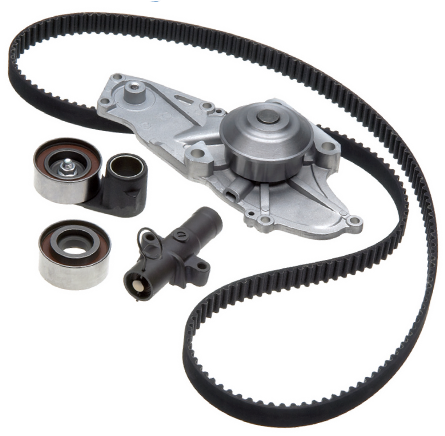Loading ...
Missing business hours data / Error occurred while getting the data.
Loading ...
Missing business hours data / Error occurred while getting the data.
Timing Belt Replacement
Belts & Hoses
Most vehicle break downs today are related to belts, hoses and cooling system problems. Today’s vehicles run hotter than ever before and have more packed into a tighter area than ever before. Belts and hoses are prone to cracking and deterioration from the elements. These items often can crack, leak, or fray from constant exposure to heat, vibration, and other harmful chemicals. If not properly maintained, any one of these could spell disaster for your engine performance.

Here are some of our recommendations to ensure belt and hose quality:
● Cooling System
● Radiator
● Radiator Hose
● Heater Hose
● Fuel Hose
● Power Steering Hose
● Heater Core
● Engine Coolant
● Power Steering Pump
● Timing Belt
● Serpentine Belt
● Alternator
● Water Pump
● Power Steering Pump
● A/C Compressor
● Radiator Cooling Fan
● Steering Gear
● Electrical Charging System
Visual Inspection of Belts
● Search for clear indications of damage (cracking, glazing, softening, or peeling)
● Test for correct tension
● Test for correct alignment
● Record belt condition for future reference
Visual Inspection of Hoses
● Search for leaks, cracks, hardening, or softening.
● Test cooling system for leaks using state-of-the-art pressure technology
● Record hose condition for future reference
Get your vehicle's belts and hoses inspected on a regular basis because damaged pieces can seriously harm your vehicle. Research shows that while most people get regular oil changes, they neglect the condition of their belts and hoses. A leaking hose or a cracked belt will cause you more trouble than an overdue oil change ever will.
Below are brief descriptions of some of the different belts and hoses we inspect:
Drive Belts:
The engine drives some of your vehicle's accessories. Instead of being supplied by electric power, these accessories rely on a series of pulleys and belts to operate. Some of these accessories include:
● Power steering pump
● Alternator
● Air conditioning compressor
● Radiator cooling fan
● Water pump
Some vehicles require a single serpentine belt to power these accessories (as opposed to several individual belts).

Accessory Drive Belts
While some accessories in your car are electrically powered by the charging system, others use the engine itself as their power source. The power for these accessories is delivered by a system of pulleys and belts. Examples of these accessories are:
- Alternator
- Water Pump for engine cooling
- Power Steering Pump
- Air Conditioning Compressor
- Radiator Cooling Fan
- Many late model cars use a single serpentine belt in place of individual belts to drive these accessories.
Hoses:
If you think of hoses as your vehicle's circulatory system, then you'll have an appropriate representation of their importance. Hoses are composed of two rubber layers with fabric in between. Types of hoses vary on make and model, but typically include:
● Fuel hose (sends gasoline from the gas tank to the engine)
● Radiator and Heater Hoses - These hoses convey coolant to the engine and heater core.
● Power steering hose (connects power steering pump to steering equipment)


Radiator and coolant hoses are vital to keep your engine from overheating. With time and use, hoses become brittle and weak. Don't wait for a failed radiator or coolant hose to leave you stranded.
Coolant System Components:
- Heater Core
- Heater Hoses
- Pressure Cap
- Thermostat
- Upper Radiator Hose
- Radiator
- Fan
- Water Pump
- Transmission Cooler
- Lower Radiator Hose
- Reserve Tank
- Antifreeze
Cooling hoses should be replaced every 5 years or 100,000 miles.
TIMING BELTS.... WHAT ARE THEY?
Piston engines can generally be divided into two groups-Interference AND non-interference engines.
If a timing belt breaks on a non-Interference engine the engine will 'free-wheel' and the piston will not contact the valves.
On the other hand, interference engines will not 'free-wheel". Severe valve train and piston damage can result if the timing belt breaks while the engine is running.
TIMING BELT REPLACEMENT GUIDE
Most manufactures have recommended replacement Intervals for replacing timing belts. A typical service Interval in between 50,000 and 60,000 miles. It is important to replace timing belts at recommended Intervals even if the vehicle has a non-interference engine. Proper maintenance prevents expensive tow bills and possible accidents due to loss of engine power while traveling at highway speeds.
Loading ...
Missing business hours data / Error occurred while getting the data.
Loading ...
Missing nap lines data / Error occured while getting the data.
